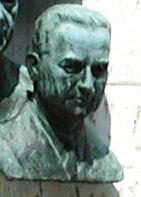Joseph L. Melnick
Joseph Louis Melnick (born October 9, 1914 in Boston , † January 7, 2001 in Houston ) was an American epidemiologist who carried out pioneering research into the spread of poliomyelitis . The New York Times called him "a founder of modern virology ".
Youth and Academic Career
At the age of seven, Melnick and his family moved from Boston to New Haven, Connecticut . He studied at Wesleyan University in Middletown (Connecticut) and earned an intermediate diploma. In 1936 he received his PhD in biochemistry , then called physiological chemistry , from Yale University . He became a member of the faculty of this college under the polio researcher John R. Paul and was professor of epidemiology from 1954.
Polio research
Melnick's research on polio found that the most common route of infection for the disease was fecal contamination, usually caused by dirty hands, and that the poliovirus could survive in the sewer for long periods of time. Other viruses, such as B. Hepatitis were also found in wastewater, which led to improved cleaning standards. Higher forms of the poliovirus were found in sewage during the summer, the time of year when the outbreaks of the disease were most prevalent, which, according to the observation of John R. Paul, clearly indicated that polioviruses were only violent during epidemic times The population and the environment. In collaboration with Dorothy Horstmann, Melnick published the results of a study that showed that polio could be transmitted by flies, although they weren't the main carriers of the disease. Melnick was one of the first virologists to discover that poliovirus belonged to a larger class of viruses known as enteroviruses , a form of virus that, under certain conditions, could invade the central nervous system.
Chief Virologist at the National Institutes of Health and Dean at Baylor College of Medicine
Melnick was elected chief virologist at the National Institutes of Health in 1957. At Baylor College of Medicine, Houston, in 1958, he was the first to receive the post of director of virology and epidemiology. Research results, which he published in 1960, showed that the attenuated ( attenuated ) vaccine, which in of Albert Sabin was used developed oral vaccine, less harmful to the nervous system was than similar vaccines. Another study found that the polio vaccine could be stored for extended periods of time with the help of magnesium chloride as a preservative, which eliminated the need for freezing. From 1968 to 1991 Melnick was Dean for Exam Studies at Baylor College. Together with cardiac surgeon Michael Ellis DeBakey , Melnick researched the possible effects of the cytomegalovirus on coronary heart disease . Research by Melnick and his team at Baylor College, published in numerous journals in the 1960s and 1970s, demonstrated that viruses, etc. a. the herpes simplex virus , which caused some forms of cervical cancer.
A dosing regimen for treating a polio outbreak in Gaza and the West Bank in the 1980s, jointly undertaken by Israeli and Palestinian health authorities, used a vaccine combination of live attenuated viruses and inactive viruses, as recommended by Melnick and Natan Goldblum , as the vaccinees, who received only four doses of the oral vaccine were still susceptible to polio.
In addition to his work as editor of a large number of scientific journals, Melnick was also the author and editor of the chapter on virology in a standard work on microbiology .
Honors
- On January 2, 1958, Melnick was honored by induction into the Polio Hall of Fame in Warm Springs, Georgia .
- The Sabin Vaccine Institute awarded him the Albert Sabin Gold Medal in 1996 in recognition of his pioneering work in polio research and the training of more than a hundred virologists over the course of his career.
Melnick died in Houston in January 2001 at the age of 86 from complications from Alzheimer's disease. He was married to Dr. Matilda Benyesh-Melnick and father of a daughter.
Individual evidence
- ↑ Altman, Lawrence K. "Joseph Melnick, Polio Pioneer, this at 86" , The New York Times , January 21., 2001
- ^ William E. Rawles, Ervin Adam, JL Melnick: An Analysis of Seroepidemiological Studies of Herpesvirus Type 2 and Carcinoma of the Cervix in Cancer Research 33, pp. 1477-1482, 1973; online as PDF here
- ↑ Tulchinsky, Theodore: Polio eradication - end-stage challenges , in Bulletin of the WHO, vol. 83 no. 2 Genebra Feb. 2005. online
- ^ Gold Medal Award
| personal data | |
|---|---|
| SURNAME | Melnick, Joseph L. |
| ALTERNATIVE NAMES | Melnick, Joseph Louis (full name) |
| BRIEF DESCRIPTION | American epidemiologist |
| DATE OF BIRTH | October 9, 1914 |
| PLACE OF BIRTH | Boston |
| DATE OF DEATH | January 7, 2001 |
| Place of death | Houston |
